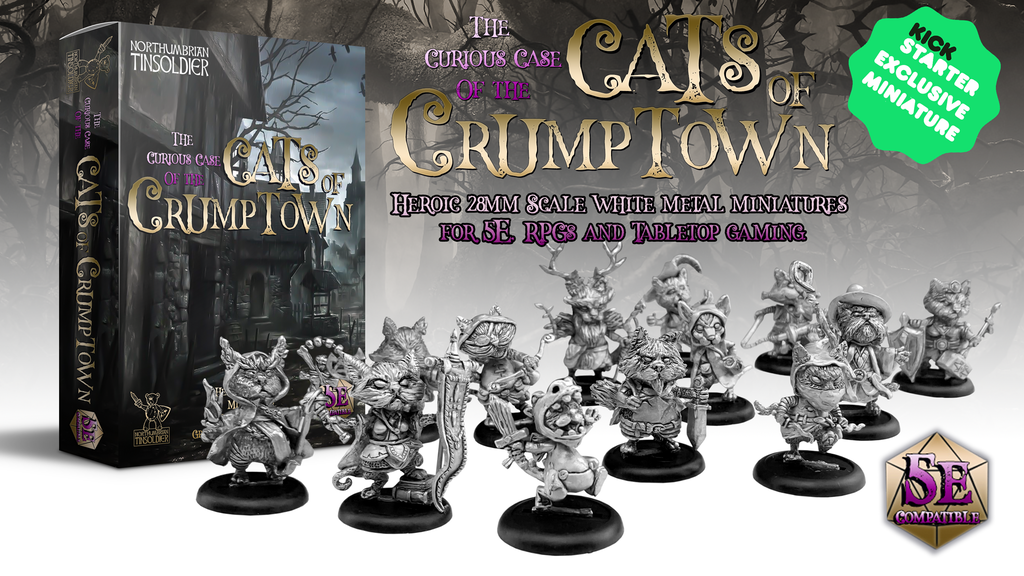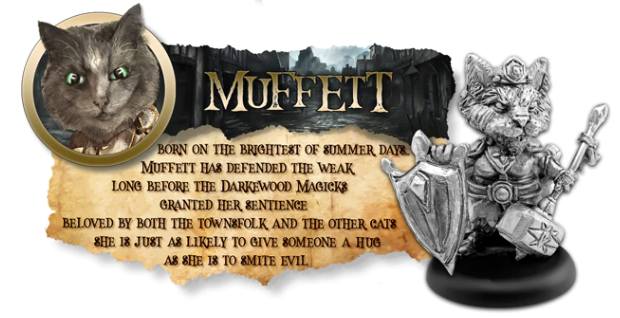|
Barak thumbed the edge of his axe as he listened to his companion drone on about the intrigues of court. Prince Kheldar was a master of political schemes, but Barak would have none of it. Give him a good honest fight any day. “Get to the point!” he snarled. “Did you talk to your aunt about the Bear Cult?” Kheldar nodded. “You aren’t going to like it.” “She won’t help?!” Barak was incredulous. “Oh no, she’s fine with it. We can get the information we need...if we all come to dinner tonight.” One of the ancestors of the D&D game is the writings of H. Rider Haggard, whose barbarian protagonists solved problems in Gordian fashion. There can be a refreshing clarity to quick violence, but domains like Richemulot, Borca, and Dementlieu are expected to have courtly intrigues, and Nova Vaasa and Darkon are no strangers to social schemes. If you’re looking for a challenge that doesn’t look like a battlefield, consider a formal social event. Whether a private dinner party or a public auction, a social event can have all the thrill of slaying a dragon, if you focus on these seven major challenges. For the first six, it’s easy enough to assign points for varying degrees of success and total them up at the end. The seventh requires a little more scorekeeping, but it’s all worth it to hear a player yell that their insult landed a critical hit. 1) Pleased To Meet You It’s normal for adventurers to brag about their exploits, but few cultures view brave deeds as the first thing they want to know about you, and many consider it gauche for you to tell the tales yourself. You’ll need to know if formal introductions are based on noble titles, academic degrees, lineage, birth sign, or something else. If you rank below your peers on this yardstick, it’s usually best to admit so up front with a little modesty and wait for an opportunity to speak about your deeds. A good host may give you an opportunity to do so immediately, or a respected member of the group might step in when you are forced to be modest. 2) A Token Of Esteem Depending upon the occasion, formal gift giving may be expected. If not, it pays to know how a small unexpected token would be received. Whether you’re giving, receiving, or exchanging, gifts represent status, and the subtext underneath a particular choice may have many layers. In the real world, a single birthday gift of Cuban cigars, for example, might snub other gift-givers by the price tag, beard the authorities by being contraband, and bear a secret reminder of a lost weekend in Cuba. On other occasions, gifts can scream rather than whisper. A powerful figure who knows her rival intends to publicly shame her with a priceless gift at their next meeting may hire outsiders to steal it, or to find something worthy of exchange. 3) Clothes Make The Man In all but the most barbaric of societies, social gatherings call for clean clothes, but that’s just the beginning. Clothes indicate status as much as gifts, and following the latest trends in fashion--or deliberately setting your own--involves a significant amount of time and attention. Even the smallest accessories can speak volumes, and usually do: social movements often identify themselves by a pin, badge, or ribbon showing you support the cause. Even without such explicit accessories, adept socialites can convey subtle messages in the choice of a hat or lapel pin. Reading the messages in a person’s clothing may grant a bonus towards influencing them, or at least eliminate the faux pas of asking where someone stands on a matter when they are literally wearing their sympathies on their sleeve. 4) Soup Or Salad? You can generally judge how challenging a dinner party is going to be by the number of courses. Each course has a specific set of expected behaviors: utensils to use, bites to take, how to speak, etc. To know how to behave, a PC can either rely on their knowledge of nobility, or just watch other people carefully and do what they do. Prepping ahead of time can grant a bonus to either of these rolls. Failure, however, means an error that the character must mitigate diplomatically to avoid diminishing their status in the eyes of those present. 5) Small Talk: The Smaller The Better Career adventurers will get the reputation of being crass and insensitive unless they learn to avoid “shop talk” around people who don’t engage in regular mortal combat. The weather may be a boring topic, but it’s a safe one: it’s slightly different every day and no one can be blamed for it. Topics with equally high variety and low sensitivity might include crop expectations, the latest opera or public games, and how fast children grow. Middling territory for small talk would be things like popular books and what people do for a living. If someone at the table brings up politics or religion, that doesn’t make it open season. You’ll usually score more points by steering the conversation back into safe waters than you will by joining in on boorish behavior. 6) Double Your Speak, Double Your Fun It’s rude to have prolonged side conversations at the table, so folks who want to go beyond small talk had better get good at hidden meanings. Know your default values to exchange innuendo, and consider establishing code words and phrases ahead of time to grant a bonus to these checks. The Message spell is also useful for unobtrusive speech, but the whispers it employs can be overheard. Try covering your mouth with a napkin, or whisper while pretending to take a sip of wine. Once away from the dinner table you may be able to talk more freely with your target, but only if you have an excuse to meet together. Even the most casual meetings can become fodder for gossip, especially across political lines or between sexes, especially in societies that have strict gender roles. 7) Casual Debate Small talk is intended to avoid arguments, but some settings actually call for something more spirited. To engage in a casual debate is perhaps the closest thing to social combat, and I highly recommend the use of some kind of reputation point system so players can actually feel the progress of the fight. For example, you can extrapolate the “hit points” and AC of each person’s argument from their related skills and abilities, and let people take aim at an argument using various social skills in place of an attack roll. Everyone should have a role to play, but those roles are often reversed from traditional combat: if a previous support character like a bard is suddenly the front-line fighter, allow the mighty thewed barbarian with minimal social graces to support the bard by laughing at jokes and glaring at the opponent to throw him off. Done properly, a good social event can feel like the party went through a minefield blindfolded, followed by a pitched battle. The fact that reputations were the only casualties only complicates the matter, because losers may have long memories and yearn to settle the score. Of course, this is an adventure game, but you should have enough here to keep it from being boring even before things take a turn for the deadly. If your players enjoy it, you can discuss whether they want just the occasional change of pace or a longer detour. Who knows? Your next campaign might be set in a more socially dangerous setting. With scheming courtiers hiding behind pleasant faces, there’s hardly a need for monsters at all. Leyshon Campbell has been playing and writing for Ravenloft for over twenty years, from the Kargatane's Book of S series, playtesting D&D 3E in a Ravenloft campaign, to the ill-fated Masque of the Jade Horror. He married his wife on Friday the 13th after proposing to her on Halloween. By tradition, the first story read at birth to each of their three children was The Barker’s Tour, from Ravenloft’s “Carnival” supplement. He is currently running the “Queen of Orphans” Ravenloft campaign. Picture Reference: https://www.etsy.com/listing/688840794/monte-cristo-invitation-regency-wedding Howdy folks! First, I’m going to flat out tell you I’m biased about this amazing Kickstarter happening right now. I wrote the 5e compatible adventure that comes with the miniatures. However, the reason I bought into working with Northumbrian Tin Soldier was the quality of their miniatures and the excitement and energy of the folks involved. The Kickstarter is already funded, by a lot. They have added stretch goals that really increase the value of each pledge level too. 1) High Quality Miniatures Northumbrian Tin Soldier creates some of the best miniatures I’ve seen on the market. I have a slew of miniatures I’ve picked up over the years, from Ral Partha, to Warhammer, to Wiz Kids, whoever, I’ve likely got a box of unpainted miniatures from them in my crate of gaming equipment. (Yeah, I’m the guy that never paints his figs… like everyone else). So, when I saw the quality of the miniatures this company produced I was BLOWN away. They are absolutely beautiful. The quality the company produces on a regular basis picks me up and hurls me to the floor. 2) You Get a 5e Compatible Adventure This is the self-serving item on the list. I wrote the adventure to accompany the miniatures and I think it is a lot of fun. While I don’t want to give away spoilers, it includes some puns, engagement with the setting and NPCs of Crumptown, and hints at a deeper backstory for the world the miniatures live within. My goal with the adventure was to give you a good start for deeper stories in and around the Darkewood, and I think it helps as a pathway into that world. Will there be more in the future? I’m not sure, but it would be great to see this universe get expanded. 3) The Miniatures Are A Great Value For $78 you get 22 miniatures. I don’t know of any other miniature set which is that good of a value. This includes the stretch goals which have already been unlocked, making this a really good value campaign. On top of that, you can back the campaign for as low as $33 and get 4-5 miniatures that are high quality. The more we add, the more we get other miniatures added to the list too, so, it’s really something that will become an even better value as time goes on. 4) The Cats The Cats themselves are awesome, both the miniatures and their story information. These cats have been changed by dark forces deep within the Darkewood. No one knows why, no one knows what this may mean for the future, but honestly, the story hooks and ideas are endless. There are cats for each of the 5e core classes, with a short backstory and hooks for other stories that you can run for them. All in all, I think Northumbrian Toy Soldier is a great company to support and I would recommend checking out their campaign on Kickstarter before it ends.
A.C.: After Collapse™ (A.C.) is a flexible d20 based post-apocalyptic tabletop role playing game. A.C. encourages classless character creation and dynamic world building after a societal collapse of many causes. These could include any type of civilization ending scenario: nuclear Armageddon, ecological disaster, medical epidemic (including zombie plagues or other imagined ills), civil or political factors, an AI menace, or anything else that can be imagined. Gameplay starts five decades or more after the last national government ceases to function. Men and women of this period think of themselves as “Survivors” because they must contend with the unforeseen consequences of actions taken long ago. 1) Adaptability All major aspects of the post Collapse experience are scalable in a way that allows each participant to enjoy basic or advanced play. Referees control the extent of knowledge that is available to players before play starts, including background knowledge that provides context and Basic/Advanced skills that could be hard to find or nonexistent. Temperature sensitive Structure Points can be assigned by referees to anything breakable. These simulate wear and tear that causes irreplaceable equipment to eventually fall apart. Armor Points can be similarly assigned to simulate the durability of armor, weapons, etc. Players and referees alike benefit from scalable effects of poison, radiation, and the effects of combat (i.e., lethal and/or nonlethal damage). Player characters are awarded Character Points (CPs) by the referee as a form of experience that can be used to improve attributes, acquire new skills, or upgrade basic skill subfields to advanced skills that represent more meaningful expertise. 2) Extent Of Knowledge Knowledge becomes power as referees decide if contextual background knowledge by category is common, obscure, or lost. Having that context informs players and referees alike of what is familiar to postapocalyptic makers and takers or what is mysterious to them when they first encounter it. The same framework is applied to the Basic/Advanced Skills that represent what heroes and villains can really do. 3) Classless Character Generation Age determines how much background knowledge and how many basic skills any character has before they are introduced to the setting. The number of dice rolled for each of the nine attributes is determined by the age of the character before they are introduced to the setting. Each is allotted 1d6 for every six years of age, to a maximum of 30 years. One category of background knowledge can be chosen for every full six years of age a character is before play. One basic skill group for every three years of age can be selected for characters prior to starting the game. Players are free to mix and match Basic skills that have been allowed by the referee (i.e., as common knowledge). 4) Combat Violence is adjudicated in 10 second rounds using a d10 initiative system to decide who goes first on a second by second basis. Characters and NPCs have Target Profile Numbers that serve as “To Hit” numbers (similar to armor class) when opponents want to attack them. That number is reduced according to amount of encumbrance the character or NPC has to slow them down, making them easier to hit. Some attributes provide additional modifiers. Injury is simulated by subtracting Hardiness points when blood is drawn or bodies are harmed; loss of Vigor points represents depletion of physical energy that can result in unconsciousness. Heat signatures and electromagnetic emissions are included for advanced game play. 5) Structure Points, Armor Points A.C. presents a system of temperature sensitive Structure Points and Armor Points that can be assigned to anything for the purpose of simulating durability. Structure Points are subtracted on a one to one basis when items or objects are damage by combat effects. Armor Points must be overcome and reduced before individuals can be harmed, simulating physical protection factors relevant to combat. Loss of all Structure Points or Armor Points indicates the item has been destroyed. 6) Poison, Radiation Nothing is more quintessentially postapocalyptic than toxins and radiation. Threat level scales have been assigned to both in an effort to flexibly simulate them in any form the referee wants to portray. Poison can be fast or slow, debilitating (weakening), or lethal. Radiation can be debilitating, harmful, mutagenic, or harmful AND mutagenic. When combined with the effects of weather, sighting rules, heat signatures, and electromagnetic emissions, poison and radiation become formidable threats for any group of intrepid explorers. 7) Renaissance Or Ruin? A.C. is a postapocalyptic tool kit that allows you to simulate and experience a wide variety of themes and situations. We’ve provided a big backstory to get you started, involving the rise of Artificial Intelligence (AI). Everything from firearms and body armor to electronics has been presented with enough detail to encourage the exploration of a shattered world, crafting to make what you want or need, and as much empire building as you can handle. Will you learn from the past and make a better future or will you forget the old world and make the most of whatever you can take? Justin Oldham is a visually impaired writer and game designer who lives in Anchorage, Alaska. He is the creator of A.C.: After Collapse, as well as the anthologies and novels based on the game. They include: Before The Collapse, During The Collapse, Haven’s Legacy, and Search for Haven Justin has written on the subject of his vision impairment. Other credits include: Tales from the Kodiak Starport, Showdown at the Kodiak Starport, Crisis at the Kodiak Starport, Bibix, The Fisk Conspiracy, and How To Write Conspiracy Fiction. Picture provided by the author. |
All blog materials created and developed by the staff here at High Level Games Archives
April 2023
Categories
All
|
Proudly powered by Weebly





 RSS Feed
RSS Feed